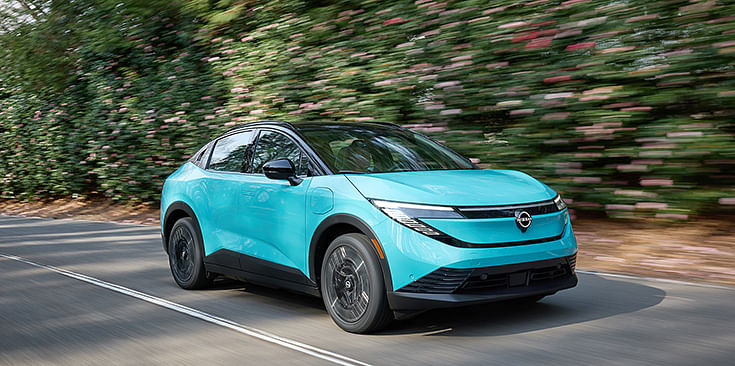Nissan reinvents Leaf as a sleek electric SUV with 600km range
First launched as a hatchback in 2010, the third-generation Leaf is unrecognisable compared with its predecessors. The new Leaf, bult on the CMF-EV platform, benefits from over 15 years of real-world insights gained through global sales of nearly 700,000 units and aims to make the most of the rapid consumer shift to SUVs.
Nissan Motor Co has launched the all-new third-generation Leaf electric vehicle. The pioneering Leaf, first launched in 2010 as a hatchback, benefits from over 15 years of real-world insights gained through global sales of nearly 700,000 units and aims to cater to the rapid customer shift to SUVs.
The MY2025 Nissan Leaf, which will be manufactured both at the Tochigi Plant in Japan and Nissan UK’s facility in Sunderland, will be sold globally. According to the Japanese carmaker, “Beyond appealing to EV intenders, the all-new Leaf provides a compelling alternative for internal combustion engine (ICE) buyers with its substantially increased maximum range, enhanced charging speed and a technology suite that makes daily driving easier and enriches owners’ lifestyles.”

A fastback-like silhouette and features such as flush front door handles, aero-tuned wheels and a flat underbody come together to deliver the bold and sleek look, but also offers a 0.26 drag coefficient for U.S. and Japan models, and an even more impressive 0.25 for European variants.
The new Leaf sits on the CMF-EV platform that's used by the larger Nissan Ariya and various Renault EVs, meaning it’s technically unrelated to the first two generations of Leaf. Two battery options will be offered, with usable capacities of 52kWh and 75kWh, giving the Leaf an official range of 271 or 375 miles (430km or 600km). But Nissan emphasises its efficiency at motorway speed, claiming it can cover more than 200 miles (320km) at an 80mph (128km) cruise.
Speaking to Autocar UK, chief engineer Hiroki Isobe said: “The aim was to set the standard for future electric vehicles,” he said. “We’re building on the Leaf DNA: it’s created for everyday customers and the goal was to create an easy-to-use EV that can be driven without any discomfort. We have a huge database of information about what customers want.”
That put the focus on maximising the efficiency of the Leaf, which resulted in an aerodynamically sculpted body, including flush door handles, a steeply raked windscreen and an underfloor cover, combining for a drag coefficient of just 0.25.
There’s also a revamped ‘three-in-one’ electric motor and a separate heat pump to optimise the efficiency of the heating system. It sits on 18-inch or 19-inch tyres, depending on spec.
The interior has also been completely reinvented, with the dashboard built around a pair of 14.3in screens running a Google-based infotainment system.
Despite the Leaf’s new fastback bodystyle, Nissan claims it has plenty of rear headroom, while the boot capacity is put at 437 litres.
The Leaf will be offered with a range of semiautonomous driving technology and a 3.7kW vehicle-to-load outlet.
Commenting on the new Leaf, Nissan president and CEO Ivan Espinosa said, “The Nissan Leaf reflects our commitment to innovation and sustainability. The original Leaf helped popularize electric vehicles, and this third generation invites consumers to embrace an EV lifestyle with a range of compelling features. It plays an important role in our Re:Nissan action plan, offering impressive performance, stylish design, and advanced technology.”
RELATED ARTICLES
Autoliv Plans JV for Advanced Safety Electronics With China’s HSAE
The new joint venture, which is to be located strategically near Shanghai and close to several existing Autoliv sites in...
JLR to Restart Production Over a Month After September Hacking
Manufacturing operations at the Tata Group-owned British luxury car and SUV manufacturer were shut down following a cybe...
BYD UK Sales Jump 880% in September to 11,271 units
Sales record sets the UK apart as the largest international market for BYD outside of China for the first time. The Seal...






 18 Jun 2025
18 Jun 2025
 8217 Views
8217 Views






































 Ajit Dalvi
Ajit Dalvi




